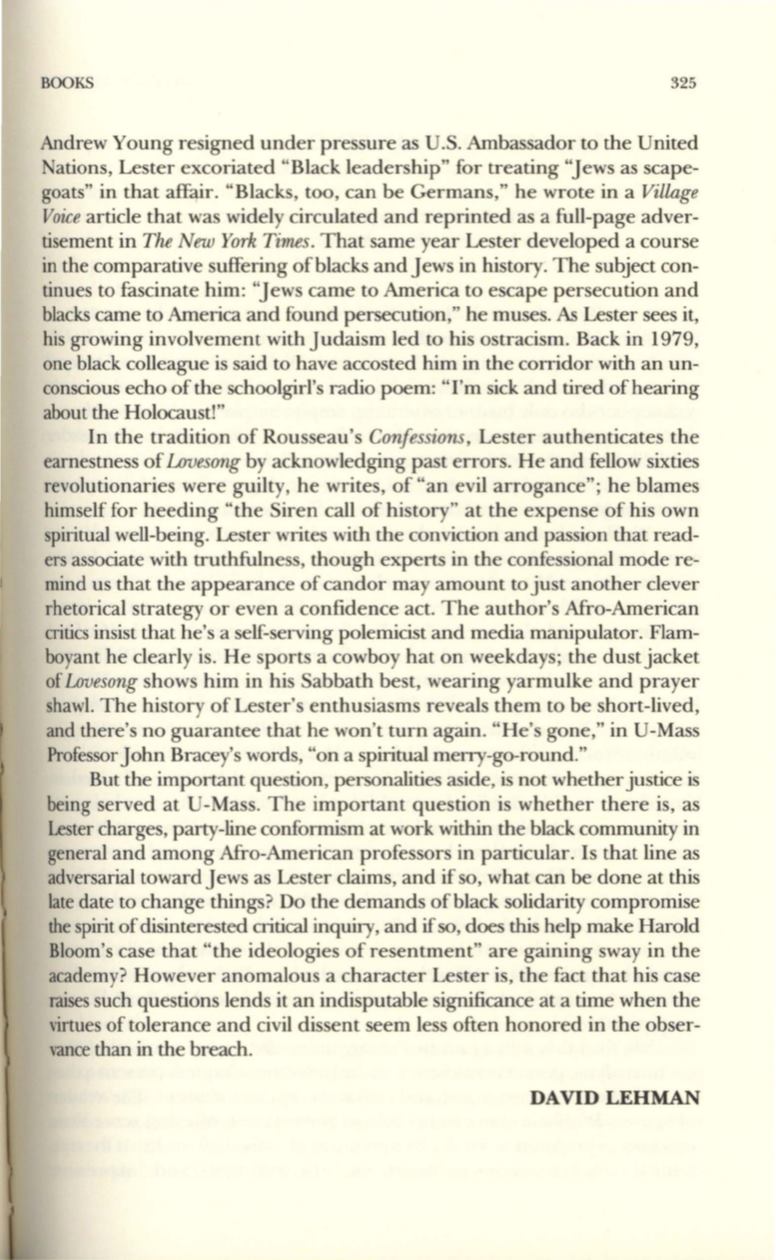
BOOKS
325
Andrew Young resigned under pressure as U.S. Ambassador to the United
Nations, Lester excoriated "Black leadership" for treating "Jews as scape–
goats" in that affair. "Blacks, too, can be Germans," he wrote in a
Village
Voice
article that was widely circulated and reprinted as a full-page adver–
tisement in
The New York Times.
That same year Lester developed a course
in the comparative suffering of blacks and Jews in history. The subject con–
tinues to fascinate him: "Jews came to America to escape persecution and
blacks came to America and found persecution," he muses. As Lester sees it,
his growing involvement with Judaism led to his ostracism. Back in 1979,
one black colleague is said to have accosted him in the corridor with an un–
conscious echo of the schoolgirl's radio poem: ''I'm sick and tired of hearing
about the Holocaust!"
In the tradition of Rousseau's
Confessions,
Lester authenticates the
earnestness of
Lovesong
by acknowledging past errors. He and fellow sixties
revolutionaries were guilty, he writes, of "an evil arrogance"; he blames
himself for heeding "the Siren call of history" at the expense of his own
spiritual well-being. Lester writes with the conviction and passion that read–
ers associate with truthfulness, though experts in the confessional mode re–
mind us that the appearance of candor may amount to just another clever
rhetorical strategy or even a confidence act. The author's Afro-American
critics insist that he's a self-serving polemicist and media manipulator. Flam–
boyant he clearly is. He sports a cowboy hat on weekdays; the dust jacket
of
Lovesong
shows him in his Sabbath best, wearing yarmulke and prayer
shawl. The history of Lester's enthusiasms reveals them to be short-lived,
and there's no guarantee that he won't turn again. "He's gone," in U-Mass
Professor John Bracey's words, "on a spiritual merry-go-round."
But the important question, personalities aside, is not whether justice is
being served at U-Mass. The important question is whether there is, as
Lester charges, party-line conformism at work within the black community in
general and among Afro-American professors in particular. Is that line as
adversarial toward Jews as Lester claims, and if so, what can be done at this
late date to change things? Do the demands of black solidarity compromise
the spirit of disinterested critical inquiry, and
if
so, does this help make Harold
Bloom's case that "the ideologies of resentment" are gaining sway in the
academy? However anomalous a character Lester is, the fact that his case
raises such questions lends it an indisputable significance at a time when the
virtues of tolerance and civil dissent seem less often honored in the obser–
vance than in the breach.
DAVID LEHMAN


